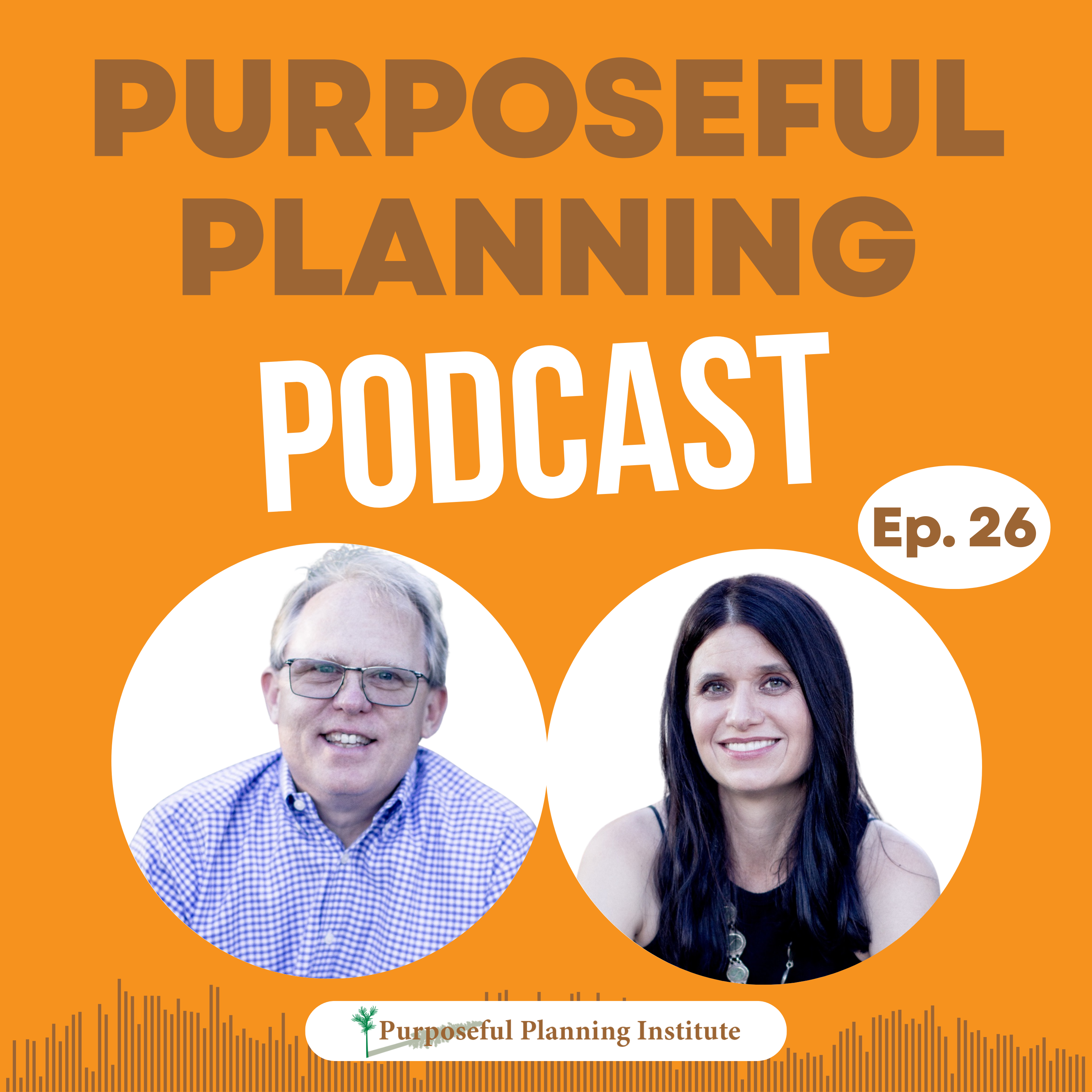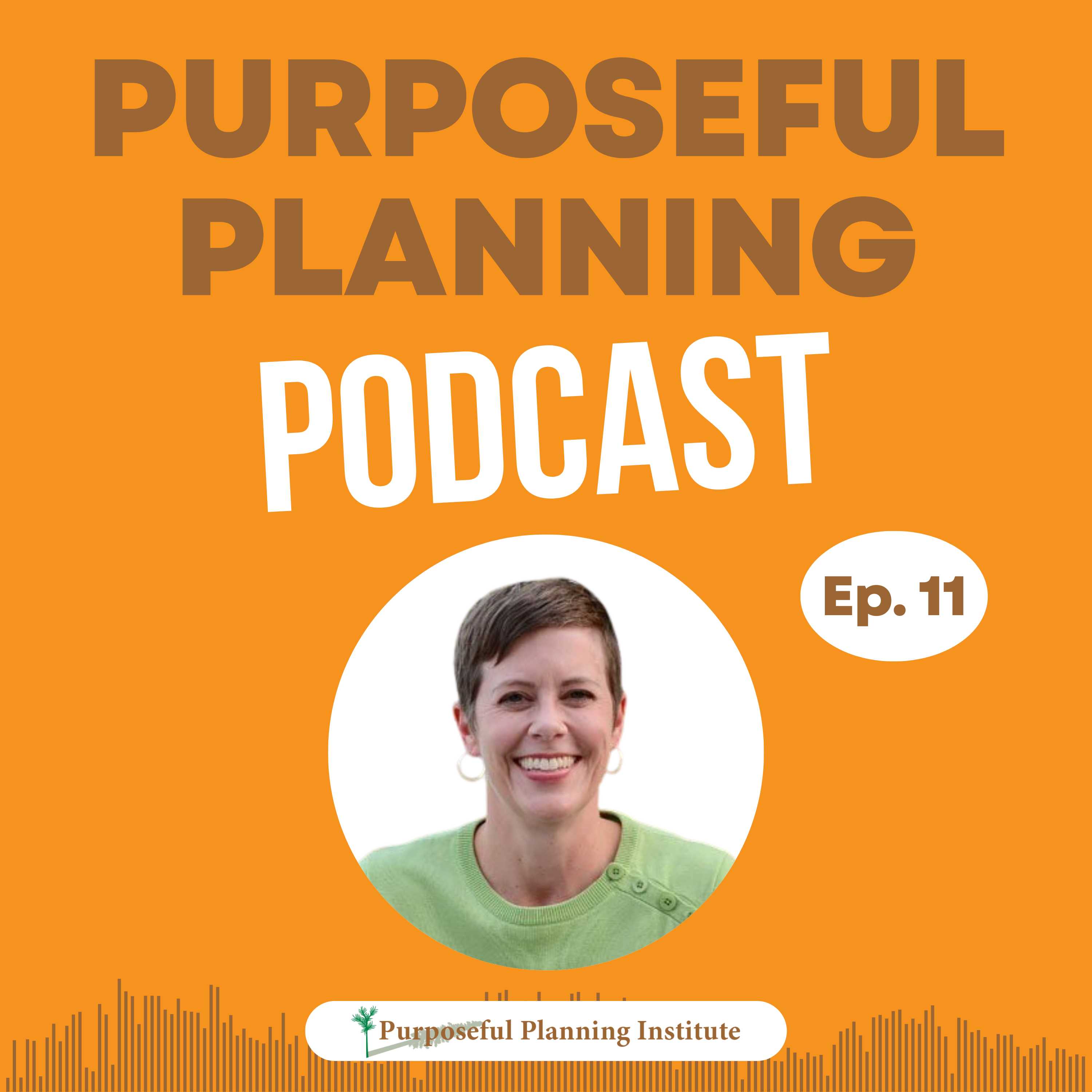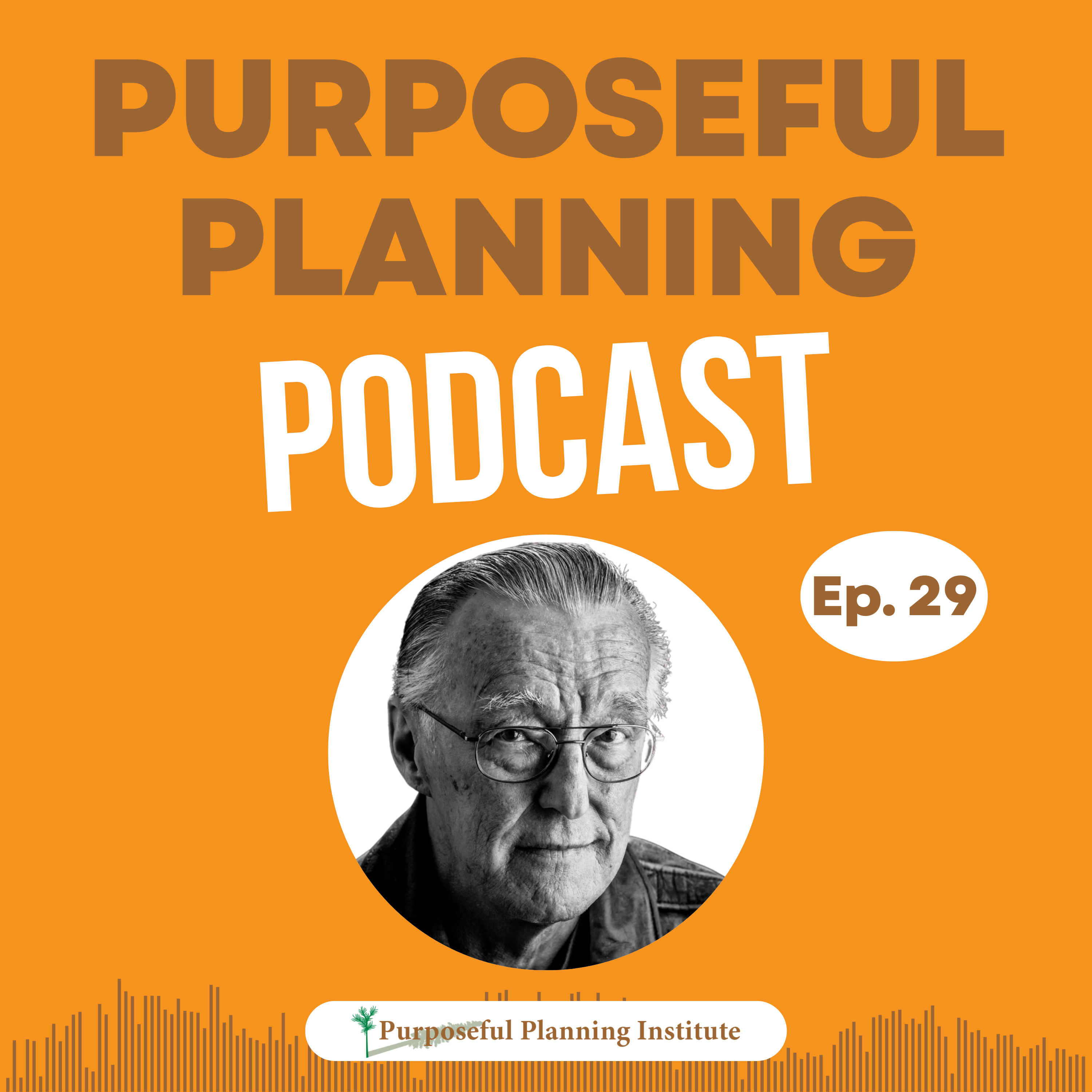Episode Transcript
JOHN A: Good day. This is John A. Warnick. I'm the founder of the Purposeful Planning Institute. It's my immense honor today and privilege for all of us to have Courtney Pullen as our guest on this Purposeful Planning Podcast. Courtney serves as a fellow of the Purposeful Planning Institute and really has served in that capacity since really the inception of PPI back in 2010 to 2011 and has made many contributions to the community over the years. One of which is Intentional Wealth, Courtney's book, which he wrote. In a sense, it's kind of like J. Hughes. Courtney was on this journey, observing families (it may not have been on five continents) but he had a lot of opportunities to observe families who were, I would say, making great strides towards purposeful plans. And he shares the secrets and the wisdom that he's gained in his journey. And it is our tradition, Courtney, to ask the guests on this podcast that they would share briefly, what I call their Purposeful Odyssey. The story of where you got started professionally and where you are today. If you could do that, before we dive into the topic of our conversation today, that'd be awesome.
COURTNEY: It'd be my pleasure, John A and thank you. It's interesting because when he asked me that question, what comes to my mind is a straight linear path between when I decided to do something and then went out to achieve it. It was not at all linear. My training originally was as a psychotherapist. And I had a private practice for about seven years and accidentally specialized in trauma and I was really good at it. So good, I looked around, there's an entire caseload of trauma patients and really was looking for a way to transition out of that work. And I was approached by a local family business, here in Denver, about working with their family. So really it introduced me to this whole world of family business consulting, and how the overlap between a family system and in a business system and how crucial that work is for families. And in that particular Odyssey, I encountered an enterprise family that no longer had an operating business. And that's when I thought, “This is different from what I've been trained in.” And I went out to read everything on the subject that I could find, which was I think two or three books at that time. Two of the three done by J. Hughes. And I found a fellow pro pilgrim on this journey, John A. Warnick, right around that same year. And we were pilgrims together in learning about the intricacies of a family and the tragedies they can become in families of significant wealth. So that's really been my journey for the last over 25 years now.
JOHN A: We've grown up. But it's been an incredible and awesome journey. And I would just echo I think I felt Courtney was much further along the path when we began to collaborate, but I learned so much sitting next to Courtney and sharing opportunities. It really has been one of the highlights of my purpose. A lot of it has been the time I've been able to spend with Courtney. So Courtney, today we're going to explore the topic of Appreciative Inquiry. This is, I think, one of the great developments that we've seen born in the last 25 or so years. And I'd love to have you share: what is it about Appreciative Inquiry and what does Appreciative Inquiry mean to you that is so valuable in the work that that many members of the Purposeful Planning Institute are doing.
COURTNEY: When you think about the world of consulting, whether it's with families or with organizations, we have a tendency to be very problem solving in orientation. And the methodology is kind of straightforward. We identify the problem. We determine root cause, analysis, and we come up with a game plan for how to address it. And then get the family system in action around addressing those breakdowns. And what can happen in that deficit based model is a family or organizational system can auger into the problem. What the Appreciative Inquiry says is that the underlying philosophy is that change occurs in the direction of our attention, what we focus on. We get more of so by going into a family and system that has significant communication problems which is pretty classic word family. And if I say to them, “Tell me about all the communication problems in the family.” Well, I hear about a lot of the problems. And I become part of that narrative about we are a family with big problems. Appreciative Inquiry says, “In fact, we need to look at a family system or organizational system differently. That every family system has something that works. The patterns that they've adapted are functional for them. They work for them. They may cause problems but it's really seeing the strengths of a family.” And it's also really acknowledging that the questions that we ask when we're working with a family create a whole pattern, a whole outcome of new possibilities, or agar them into more problems. It's also a lot of confidence that a family system has strengths. And they do. They don't want to be focusing on the weaknesses. They really want to be seen for their value. And then lastly, that language creates reality. And I'll go into more detail about what that means. But those, John A, are some of the basic underlying tenets of Appreciative Inquiry.
JOHN A: That was excellent, Courtney. And as I recall, correct me if I'm wrong here, I want to take the Appreciative Inquiry back to David Cooperrider. And I think, correct me again, but I think he was centered somewhere in Ohio, maybe in the Cleveland area.
COURTNEY: He is in Case Western Reserve.
JOHN A: Cleveland, Ohio. And what's interesting about that is I've often said, “Can anything good come out of Ohio?” And yet, this Appreciative Inquiry is a huge development. The influence in Appreciative Inquiry he had is to me, as we think we're going to see very shortly, the emergence of the book Wealth 3.0. And the suggestion from James, Dennis, and Kristin, that we're on the cusp. We're entering a new kind of age or developing mode for the work that we do in this field. And there's going to be this increased emphasis on positivity. And appreciative inquiry certainly has got to be something that we carry with us. We don't abandon by any means that it could be, I think, very fundamental for those who want to thrive and create sustaining practices in this Wealth 3.0 world. So Courtney, I love what you've taught me about the different types of change that we can help individuals and families through. Do you want to share a little bit of your wisdom around change?
COURTNEY: Yeah. There are three kinds of change in general historical reality. Historical reality is what we bring from our past. It's our personality. It's our basic psychology. It's family history, just like historical reality would suggest to us. The present reality is the existing cultural norms of a family system: its political environment and cultural environment. Anticipatory future is the third one. And this is one that Appreciative Inquiry is based on and rooted in. And that is our hopes and dreams for the future. And when you just hear it, it sounds so much more optimistic and has more of a calling to it than the first two. And we spend most of our time as consultants in the first two. We sell them to think about what's the anticipatory future of a family system. But what a way to meet a family is in their desire for a better future for themselves, in their desire for: How do we live in our potential? How do we live into what's possible? We just hear my voice. It sounds a lot more optimistic and encouraging than saying, “Okay. Let's roll up our sleeves and talk about everything that's screwed up in his family system.”
JOHN A: I love that. I've been reading a book recently called The Obstacle is the Way. The first name of the author is Ryan Holiday, I believe.
COURTNEY: Oh, yes.
JOHN A: The Obstacle is the Way is an incredible book that, to me, invites us to think about obstacles. The need for change, in a sense, would be another buzzword. They really are the opportunities for this kind of anticipatory challenge that opens up when we embrace the possibility that there might be a brighter future. It's beautiful. But there's also the alluring you call it the Pygmalion effect. And I associated it with Rex Harrison of My Fair Lady. But tell us a little bit about what you mean by the Pygmalion effect.
COURTNEY: Originally, the Pygmalion effect was a research design in the 1960s. And thankfully, how we design our research has changed dramatically from the 1960s. But what they did is they randomly assigned three groups of students to three different sets of teachers, and said to Group A, “You're gonna have an awesome semester.” These kids are high achievers. They're really smart kids. They have good character and kind of ‘enjoy yourself, everything's gonna be fine.’ The second group of teachers retold — again, these are randomly assigned — that this group of kids are your typical students. They're not overachievers. But they're fine. The third group of teachers as you can anticipate that we're told these are problem kids. They have some challenges and learning disabilities. ‘Good luck with this group of kids.’ So as you can already tell from how I'm approaching the story, the outcome was that the three groups of teachers treated the kids in the manner that they were told to expect in essence. It is like a self-fulfilling prophecy, if you will. So at the end of the semester, of course, that's exactly what happened. The overachievers are great, so forth and so on. You've seen me do this with families, John A, talk about what are the files that we have on each other as a family. It's common in any family system as you've got the identified problem, or the clown, or the overachiever, or the underachiever, or whatever. All of those roles become rarified in some way in a family system. And we hold on to a narrative, a self-fulfilling prophecy about, “Well, so and so's just not good with numbers.” And I've seen several examples in a family business system that they are overlooking. The child and the family that have the best skills to take over the business but they didn't allow them to do that because of old childhood scripts about that child. And part of the self-fulfilling prophecy is the kids begin seeing themselves in that way. So those kids in those three different classrooms started having a view of themselves in that same way. So that's depressing on the one hand because you could see the tragedy inherent in that and conversely, to us as trusted advisors. If we can hold that positive image of a family system and its individual members, they will start seeing themselves in that same light. So there's a lot of power in essence, turning it around for our families.
JOHN A: So going back to really applying Appreciative Inquiry in this kind of more positive approach to solving challenges families faced, how do you compare this to AI?
COURTNEY: It's funny you say that in this day and age. So a classic problem solving approach that most consultants do is that they identify what's the problem. They identify the root cause analysis. What are all the possible solutions? And they develop an action plan or a treatment plan, in essence. So the view, that's pretty overt in that, is families or an organizational system is a problem to be solved. And let me pause before I go on to AI. What person or what family wants to be seen as a problem to be solved?
JOHN A: Right. Exactly.
COURTNEY: Yeah. And that's how we are basically wired as human beings because in our field, in our discipline, we are attracted to this model of we are the expert. That's, in fact, what families pay me to be is an expert or to have expertise in this particular area. Of course, we have expertise in this area. But if we engage our expertise in this problem solving approach, that is how the family is going to see themselves as a problem to be solved. Appreciative Inquiry, or AI is saying, let's start with appreciating what is. And that family system, really knowing that every family has strengths and then envisioning from that what might be, and what would it look like to have more of that, what should it be for us to be better at this, and then how can we envision the new possibilities, how we could come together, and then the AI approach. Now I want to be sensitive to something. And when I'm doing Appreciative Inquiry training, I say to people, “Okay if your car has a flat tire when you leave this workshop, I would not advise you to get out and look at the tire and say, ‘Let's appreciate when I've been at my best.’ No. There are definitely times where there is a problem, we need to get into action. We need to solve a problem.” Absolutely.
JOHN A: But that's a great metaphor. I love it.
COURTNEY: Good. And how I use this with families, John A, is that let's use the classic breakdown in the family system. Breakdown in communication or a breakdown in trust in the family. If I'm using an AI type of model, I'll go in and say, “I understand that this area of breakdown is this concern that has brought you into this engagement with me, I validate that. I empathize with it and I understand the significance of that and the toll it's taken on the family system.” So I don't deny it and say, “Oh, let's just focus on the positive.” That's not what this is about at all. What it is instead is again, acknowledging and validating. Then saying, “Can you describe to me those times in your family when you have come together. You've overcome an obstacle. You've overcome a challenge. Your communication was surprising, and its strengths and its particular merit.” So then in the AI interviews, as I'm asking family members to do that, or in a whole family meeting, I'll have tables of family and members talk about the times they have overcome a challenge successfully. That already creates new narratives like, “Wait a minute. We can do a good job of this. We have excelled in this area.” Then we identify what made that happen. And then I get very specific about and I do the opposite of a root cause analysis and basically say, “What brought that to life or what made that happen for you all.” And that list those out and brainstorm about it. And there's a lot of excitement and generativity in the room. And then I say, “Okay. What would it look like to have more of that, once possible? How could you create it? How could you be more intentional about having more of that in the family?” So those are the fundamental steps that I'll take a family through in this lens of AI.
JOHN A: Let’s not be confused by our use of AI. We're using AI as the descriptor for Appreciative Inquiry. This is the disclaimer: There is no linkage here to AI as Artificial Intelligence. No doubt it will contribute as well to our finding ways. But I really think what I hear, and I'm so grateful, Courtney, that in this 20 minutes or so, you've been able to help us see both traditional approaches to family enterprise advisory work, and then the possibility that AI or Appreciative Inquiry could really become a very valuable approach for a consultant to use, who wants to improve the relationships and the outcomes within the family or the family enterprise they're serving. I think this has been very, very helpful. And it's a great step towards helping us create a more positive atmosphere to foster greater appreciation and collaboration within the family. There's so much to be gained by applying the wisdom that Courtney shared with us today. Do you have any final parting wisdom that you can distill into 30 to 60 seconds, Courtney?
COURTNEY: Yeah. I want to return to something you said, John A, which is the Appreciative Inquiry, Organizational Change model that came out of Case Western Reserve and David Cooperrider, and his team are the creators of Appreciative Inquiry. It's been used with organizations for our I believe it's around 25 plus years now. So people want to learn more about it. That would be a great resource about it. You can Google it and really learn a lot more about it. I just started using it with families after I was originally trained in my organizational consulting work. It just started making sense to me that this applied definitely to family. So I would encourage the audience to consider that new possibility for themselves. That would be maybe a fresh way, a new toolset for them to add to how they approach their work.
JOHN A: Wonderful. Thank you again, Courtney.
COURTNEY: It's my pleasure, John A. Thank you.


